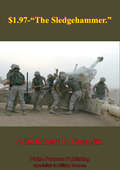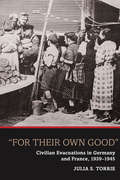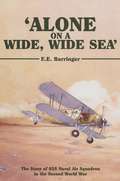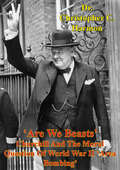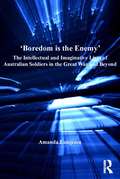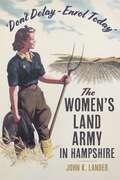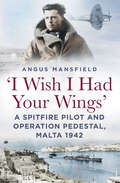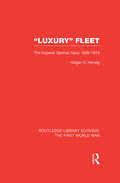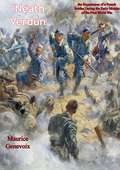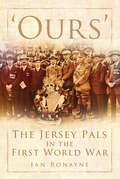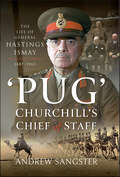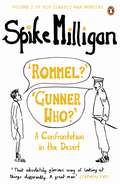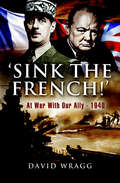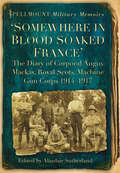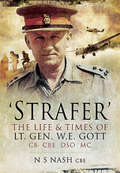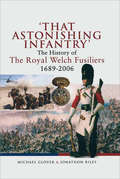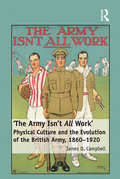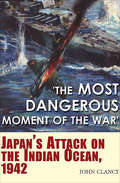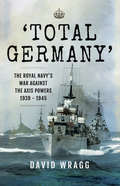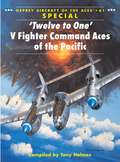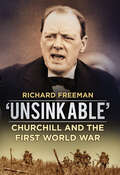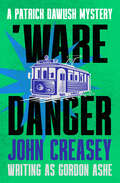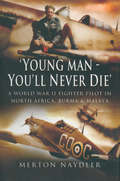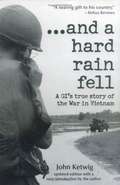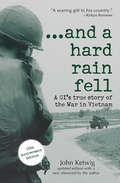- Table View
- List View
$1.97-“The Sledgehammer.” (Eyewitness To Modern War #4)
by Msg Patrick W. Bean Sr.Master Sergeant Bean recounts his experiences during the first Gulf war as an artillery specialist in Operations Desert Shield and Desert Storm.Success of any war, conflict, or operations Soldiers must meet the enemy, defeat the enemy on the battlefield, and return home safely. Defending our nation during the Gulf War was the high point of my career. This accomplishment serves as a key to my successful military career. Writing this personal experience brought memories good and bad. Although we won the war aboard, a battle was lost in my family. The psychological toll of war deeply affected my family. My personal experience paper will highlight psychological factors I overcame during preparation for combat, combat operations and the psychological effects on my family.
''For Their Own Good''
by Julia S. TorrieThe early twentieth-century advent of aerial bombing made successful evacuations essential to any war effort, but ordinary people resented them deeply. Based on extensive archival research in Germany and France, this is the first broad, comparative study of civilian evacuations in Germany and France during World War II. The evidence uncovered exposes the complexities of an assumed monolithic and all-powerful Nazi state by showing that citizens' objections to evacuations, which were rooted in family concerns, forced changes in policy. Drawing attention to the interaction between the Germans and French throughout World War II, this book shows how policies in each country were shaped by events in the other. A truly cross-national comparison in a field dominated by accounts of one country or the other, this book provides a unique historical context for addressing current concerns about the impact of air raids and military occupations on civilians.
'Alone on a Wide, Wide Sea': The Story of 835 Naval Air Squadron in the Second World War
by E.E. BarringerThis is the story of 835 Naval Air Squadron as told by one of its surviving officers. It tells the story of the outstanding fleets of flying and the importance of the Merchant Navy in the Second World War.
'Are We Beasts' Churchill And The Moral Question Of World War II 'Area Bombing'
by Dr Christopher C. HarmonThis historical reassessment of the World War II British bombing campaign notes that though in 1940 Churchill declared that he was waging “a military and not a civilian war” to destroy “military objectives” and not “women and children,” within eighteen months both types of targets would be struck by Bomber Command. The author searches for the reasons in “three contiguous realms” of strategic influence: moral (and legal), political, and military. The study concludes that although for much of the war “area bombing” of cities was a “tragic necessity” meeting the ‘reasonable man’s’ standard of what was decently allowable given the blunt weapons the Allies had” and the evils they faced, nonetheless Allied leaders could have and should have abandoned indiscriminate bombing in the last phases of the conflict, when more precise means were at hand and “Nazi power had been overmatched.”
'Boredom is the Enemy': The Intellectual and Imaginative Lives of Australian Soldiers in the Great War and Beyond
by Amanda LaugesenWar is often characterised as one percent terror, 99 per cent boredom. Whilst much ink has been spilt on the one per cent, relatively little work has been directed toward the other 99 per cent of a soldier's time. As such, this book will be welcomed by those seeking a fuller understanding of what makes soldiers endure war, and how they cope with prolonged periods of inaction. It explores the issue of military boredom and investigates how soldiers spent their time when not engaged in battle, work or training through a study of their creative, imaginative and intellectual lives. It examines the efforts of military authorities to provide solutions to military boredom (and the problem of discipline and morale) through the provisioning of entertainment and education, but more importantly explores the ways in which soldiers responded to such efforts, arguing that soldiers used entertainment and education in ways that suited them. The focus in the book is on Australians and their experiences, primarily during the First World War, but with subsequent chapters taking the story through the Second World War to the Vietnam War. This focus on a single national group allows questions to be raised about what might (or might not) be exceptional about the experiences of a particular national group, and the ways national identity can shape an individual's relationship and engagement with education and entertainment. It can also suggest the continuities and changes in these experiences through the course of three wars. The story of Australians at war illuminates a much broader story of the experience of war and people's responses to war in the twentieth century.
'Don’t Delay - Enrol Today': The Women's Land Army in Hampshire
by John K. LanderThe employment of female labour on farms during two world wars was essential to replace thousands of men who relinquished agricultural jobs to join the armed forces. ‘Land girls’, the majority of them from urban districts, maintained supplies of grain, horticultural products and livestock, succeeding in overcoming substantial reductions in food imports caused by disruptive enemy action to the pattern of shipping trade.Hampshire played a major part in the national selection, training and placing of land girls on farms. They undertook hard, physical work in all weathers for many hours a day, often a long way from home. It is generally agreed that Women’s Land Army members received inadequate recognition for their valuable contributions.Seventy-five years after the final disbandment of the Women’s Land Army, this book intends to correct that deficiency and shed light on its invaluable work.
'I Wish I Had Your Wings': A Spitfire Pilot and Operation Pedestal, Malta 1942
by Angus MansfieldIn August 1942, British launched Operation Pedestal in an attempt to deliver supplies to the stricken island of Malta, an Allied base which had been under Axis blockade for months. From 9–15 August a convoy of some 50 ships ran the gauntlet of Axis bombers, submarines, E-boats and minefields. Of the original fourteen merchant vessels, only five reached Malta Grand Harbour. In 'I Wish I Had Your Wings', Angus Mansfield relates the experiences of two men involved in Pedestal, Captain David Macfarlane of MV Melbourne Star and his nephew David Mejor, one of the Spitfire pilots who fought to protect the convoy. Told using their log books, letters and papers, this is the story of one family’s contribution to a relief operation that cost over 400 Allied lives, but which has gone down in history as one of the most important British strategic victories of the Second World War.
'Luxury' Fleet: The Imperial German Navy 1888-1918 (Routledge Library Editions: The First World War)
by Holger H. HerwigOriginally published in 1980 ‘Luxury’ Fleet (the phrase was Winston Churchill’s) was the first history of the Imperial German navy from 1888 to 1918. After tracing the historical background to German naval ambitions, the first two sections of the book analyse Admiral Tirpitz’s programme of building a battle fleet strong enough to engage the Royal Navy in the North Sea. The author shows the fleet in its European setting and describes the warships and the attitudes of the officer corps and seamen. The final section of the book discusses the tactical deployment of the German fleet during the First World War, both in home waters and overseas; and it weighs the balance between those who supported fleet actions in preference to those who favoured cruiser and submarine warfare.
'Neath Verdun: the Experiences of a French Soldier During the Early Months of the First World War
by Maurice Genevoix“The war of the French volunteersThis book does not concern the Battle of Verdun in 1916—widely considered to be the largest battle in world history, rather it positions the action geographically for the reader. Written during wartime this account concerns the personal experiences of a young officer of the French infantry from the earliest days of the Great War through a period of comparative fluidity of movement before the stalemate of trench warfare. The fighting concerns the actions about the Meuse and the Marne in the first year of the war from a French perspective and concludes as the 'armies go to earth' in the early part of 1915. Genevoix takes the reader into the heart of his enthusiastic young group of comrades and soldiers on campaign to provide valuable insights into the opening phases of the great conflict the French infantry knew.”-Print ed.
'Ours': The Jersey Pals in the First World War
by Ian RonayneFor the first time, the story of Jersey in the First World War is revealed. Whilst the island's role in the Second World War is well documented, a generation earlier another devastating war had struck Jersey, jeopardising the lives and liberties of its people. In 1915, a band of 300 young men known as the Jersey Company volunteered to fight for king and country in a war beyond the comprehension of many. Feted as heroes, they proudly took their place in the trenches of the Western front. But the war was to have a devastating effect - both on the Jersey Company and their island. Soon the volunteers were not only fighting the enemy, but also waging a bitter struggle for continued recognition and support from home. Accompanied by some incredible rare photographs, this book tells the moving but ultimately tragic story of one small and unique unit caught in the maelstrom of the Great War. This is an eye-opening account of one of the most important periods in Jersey's history and promises to fascinate anyone interested in the island's extraordinary past.
'Pug'–Churchill's Chief of Staff: The Life of General Hastings Ismay KG GCB CH DSO PS, 1887–1965
by Andrew SangsterGeneral Hasting Ismay, invariably referred to as ‘Pug’, was one of the most intriguing, yet less well known, leading military characters of his era. This overdue biography describes how an officer who fought tribesmen in India and Dervishes in North-East Africa, thereby playing no significant role in The Great War, found himself as Winston Churchill’s Chief of Staff throughout the Second World War. In this hugely influential position, he eased the often fraught relationship between a determined and obstinate Prime Minister and his top military advisors. His tact and diplomacy were tested to their limits oiling the wheels with our American allies, both political and military, even those with Anglophobic tendencies. Based in 10 Downing Street, Pug accompanied Churchill on his overseas visits and to the major conferences. Post-war Ismay assisted Mountbatten in the partitioning of the Indian sub-continent before becoming the first NATO Secretary General, a measure of the high regard the United States and other nations held him in. Despite the influence he wielded during and after the Second World War, Ismay remains a mysterious figure who somehow managed to maintain the trust of those with whom he worked and dealt with under the most testing and stressful conditions. This insightful biography is a most welcome and valuable addition to the history of the period.
'Rommel?' 'Gunner Who?': A Confrontation in the Desert (Spike Milligan War Memoirs)
by Spike MilliganVOLUME TWO OF SPIKE MILLIGAN'S LEGENDARY MEMOIRS IS A HILARIOUS, SUBVERSIVE FIRST-HAND ACCOUNT OF WW2'Brilliant verbal pyrotechnics, throwaway lines and marvelous anecdotes' Daily Mail 'Desperately funny, vivid, vulgar' Sunday Times ______________'Keep talking, Milligan. I think I can get you out on Mental Grounds.' 'That's how I got in, sir.' 'Didn't we all.' The second volume of Spike Milligan's legendary recollections of life as a gunner in World War Two sees our hero into battle in North Africa - eventually. First, there is important preparation to be done: extensive periods of loitering ('We had been standing by vehicles for an hour and nothing had happened, but it happened frequently'), psychological toughening ('If a man dies when you hang him, keep hanging him until he gets used to it') and living dangerously ('no underwear!'). At last the battle for Tunis is upon them . . .______________'The most irreverent, hilarious book about the war that I have ever read' Sunday Express 'Milligan is the Great God to all of us' John Cleese 'The Godfather of Alternative Comedy' Eddie Izzard 'A totally original comedy writer' Michael Palin 'Close in stature to Lewis Carroll and Edward Lear in his command of the profound art of nonsense' Guardian
'Sink the French!': At War with Our Ally—1940
by David WraggA history-defining moment in World War II, when the allied nations of England and France stood on the precipice of betrayal—and war with each other. After the forces of Nazi Germany launched their Blitzkrieg assault on Holland, Belgium, and Northern France, the tentative relationship between Great Britain and France was strained to the limit. For when the Vichy regime surrendered, the British had grave fears that the Germans would force the French naval fleet—the fourth largest in the world—to turn against their former ally, while in fact their orders were to scuttle should the Germans attempt to seize them. ‘Sink the French!’ examines the precursors to the fall of France and its consequences, most particularly the way the French Navy was dealt with. It examines the confused situation that France’s defeat created, including the rise of a relatively junior French general, Charles de Gaulle, who was smuggled out of France by the RAF. Elsewhere French ships were boarded and seized by the British, and at Oran, Algeria, their fleet was bombarded by the Royal Navy—just as there were other incidents including French aircraft bombing Gibraltar. This insightful exploration of a world sinking into chaos—and the mistrust war can breed between allies—is a must-read for anyone interested in this pivotal moment in history, when opposition to the Nazis was almost broken.
'Somewhere in Blood Soaked France': The Diary of Corporal Angus Mackay, Royal Scots, Machine Gun Corps, 1914-1917 (Spellmount Military Memoirs)
by Alasdair SutherlandFrom the heat and dust of the Dardanelles to the mud of the Western Front, Corporal Angus Mackay had one constant companion, his diary. He wrote of the battles and campaigns he fought in, names that would go down in history: Gallipoli, the Somme, Ypres and Arras. Serving in the the 1st/5th Battalion (Queens Edinburgh Rifles) Royal Scots and later the 88th Brigade Machine Gun Corps, he left a record of one man's extraordinary and tragic war. In Somewhere in Blood Soaked France, Alasdair Sutherland reveals this previously unpublished account of the First World War, complete with historical context, orders of battle and extracts from official war diaries. This rare source - it was an offence to keep a record in a case of capture - offers a stirring insight into the bravery of Mackay and his companions, who were not afraid to die for their country. 'If I go under it will be in a good cause, so roll on the adventure.'
'Strafer': The Life & Killing of Lt. Gen. W.E. Gott CB CBE DSO MC
by N. S. NashUnexpectedly selected by Churchill to command 8th Army in 1942 in place of the sacked Auchinleck, 'Strafer' Gott was targeted by German intelligence as he flew to Cairo to take up his new post. Six ME109s intercepted his aircraft and, after shooting it down, deliberately machine-gunned the crash scene. Gott became the only Allied general to be successfully targeted by the Germans and, as a result, Montgomery was given command and the rest is history.But as this long overdue and well researched biography reveals, 'Strafer' deserves to be remembered for his exceptionaltalents, meteoric career and record of gallantry. As a young officer in The Great War he won the Military Cross (many thought a VC would have been more appropriate) and he repeatedly attempted to escape. In 1939 he was commanding his Battalion as a Lieutenant Colonel and two years later he became a Lieutenant General. He was recognised as a superb Desert General whose aggression, originality and leadership qualities were supported by charm, warmth and compassion.While it is fascinating, if unproductive, to surmise what would have happened had Gott and not Monty fought Rommel, it can be confidently said that relations with our allies would have benefitted.Drawing on primary source material, this first biography of an outstanding soldier and commander is not only a rewarding and revealing read but an important addition to the bibliography of the Second World War.As featured in the Dover Express, Ashford Herald and Folkestone Herald.
'That Astonishing Infantry': The History of The Royal Welch Fusiliers, 1689–2006
by Michael Glover Jonathon RileyThe Royal Welch Fusiliers were present at all Marlborough's great victories; they were one of the six Minden regiments; they fought throughout the Peninsula and were present at Wellington's final glorious victory at Waterloo. In The Great War their officers included the writer poets Siegfried Sassoon and Robert Graves; their 22 battalions fought not just on the Western Front but at Gallipoli, in Egypt, Palestine, Salonika, Mesopotamia and Italy. In WW2 they won battle honours from the Reichswald to Kohima. More recently they have served with distinction in the war against terror in the Middle East. Like so many famous regiments the RWF are no longer in the British Army's order of battle having been amalgamated into the Royal Regiment of Wales. But this fine book is the lasting memorial to a fiercely proud and greatly admired regiment.
'The Army Isn't All Work': Physical Culture and the Evolution of the British Army, 1860–1920
by James D. CampbellBetween the Crimean War and the end of the First World War the British Army underwent a dramatic change from being an anachronistic and frequently ineffective organization to being perhaps the most professional and highly trained army in the world. Historians have tended to view that transformation through the successive political reform efforts of those years, but have largely overlooked the ways in which the Army transformed itself from within. This change was effected through the modernization of training, operational and leadership doctrines. The adoption of formal physical training and organized games played a central part in this process. With its origins in elite public schools and upper-class country homes, the Army's philosophy of Athleticism was a part of the ethos of 'muscular Christianity' widely held in contemporary British institutions. Under the potent influence of this philosophy, military sport went from a means of keeping soldiers from drink and the officers from duty, to an institutionalized form of combat training. This book documents the origins and development of formal physical training in the late Victorian Army and the ways in which the Army's gymnastic training evolved into a vital building block of the process of turning a civilian into a fighting man. It also assesses the nature and extent of British military sport, particularly regimental sports, during this period of evolution for the Army. Through an investigation of the Army's physical culture during this dynamic period, one can gain an understanding of not only how the Army's change from within occurred, but also of some of the important links between the Army and its parent society.
'The Most Dangerous Moment of the War': Japan's Attack on the Indian Ocean, 1942
by John Clancy“A well-detailed account of the [World War II] raid, which badly stung the Royal Navy but which the Japanese failed to exploit to a strategic advantage” (Seapower).In early April 1942, a little-known episode of World War II took place. Said by Sir Winston Churchill to be “the most dangerous moment of the war,” the Japanese made their only major offensive westwards into the Indian Ocean. As historian Sir Arthur Bryant said, “A Japanese naval victory in April 1942 would have given Japan total control of the Indian Ocean, isolated the Middle East and brought down the Churchill government.”Having crippled the American fleet at Pearl Harbor, the Japanese turned their sights on the British Eastern Fleet based at Ceylon. Occupation of Ceylon, now Sri Lanka, would not only provide the Japanese a springboard into India but also control of the essential convoy routes to Europe and the Western Desert. And aside from the British Eastern Fleet, the Indian Ocean lay undefended.In April 1942, a Japanese fleet led by six aircraft carriers, four battleships, and thirty other ships sailed into the Bay of Bengal. In the ferocious battles that followed, the British lost a carrier, two heavy cruisers, and many other ships; however, the Japanese eventually turned back, never to sail against India again. John Clancy, whose father survived the sinking of HMS Cornwall during the battle, “masterfully combines the strategic overview, the tactical decision making and many personal experiences to bring this episode of the war to life” (WWII Today).“Absolutely enthralling.” —Books Monthly“Well researched . . . a balanced view of men acting under the stress of war during a critical time.” —WWII History
'Total Germany': The Royal Navy's War Against the Axis Powers 1939–1945
by David WraggThe author of A Century of British Naval Aviation, 1909-2009 examines the losses and successes of the Royal Navy during World War Two. On the declaration of war in 1939, the British Admiralty signaled all warships and naval bases &“Total Germany, Total Germany.&” It was fortunate that of Germany&’s three armed services, the Kriegsmarine under Grosseradmiral Erich Raeder was the least well prepared. True, Admiral Karl Donitz&’s U-Boat force was to give the Allies many anxious times, but Hitler was never comfortable or competent in his handling of naval surface forces. &“Total Germany&” is a concise yet comprehensive account of the Royal Navy&’s part in the war at sea and the measures taken to ensure victory. The different approaches taken by the warring countries are expertly examined. The author reviews the differing strategies and tactics of the various theatres such as the Far East, Mediterranean, Atlantic and Arctic. &“Not only does it cover every major event during WWII the author brings up some other less well known actions. A thoroughly enjoyable read.&”—Ton Class Association
'Twelve to One' V Fighter Command Aces of the Pacific
by Tony Holmes Chris DaveyThis volume details the experiences of 107 elite American aces in combat against the Japanese. The highest scoring US pilots of World War 2 fought against the Japanese Army Air Force and Imperial Japanese Navy over the jungles of New Guinea and the Philippines. Flying P-38s and P-47s, men such as Dick Bong and Thomas McGuire won the Medal of Honor for their successes in combat in 1943-45. 'Twelve to One' is a rare document that details the 'tricks of the trade' employed by these men. This volume also includes biographies of the men whose tips for aerial combat make up the text, and the V Fighter Command Manual.
'Unsinkable': Churchill and the First World War
by Richard Freeman‘Unsinkable’ is the story of a man unjustly vilified: Churchill in the First World. His enemies – the Tory party – censured him for Antwerp, the Dardanelles and Gallipoli. He could do no right and was regarded as a dangerous maniac. But the true story is quite the opposite. This book tells how, as a brilliant First Sea Lord, Churchill was ousted by his enemies, yet clawed his way back to power against all the odds. As the leading critic of senselessly sending men to march towards machine guns his calls for ‘machines not men’ went unheeded. After a spell in the trenches he returned to London to clear his name over the Dardanelles. Then he relentless fought his way back to power through his brilliant, incisive criticism of the land war. The unsinkable politician finally became Munitions Minster in 1917, where he pushed output to unimagined levels. His weapons delivered the victory that had eluded others for the previous three years.
'Ware Danger (The Patrick Dawlish Mysteries)
by Gordon AsheBritish sleuth Patrick Dawlish is about to discover that during World War II, there&’s as much intrigue on the home front as on the front lines. The big, broken-nosed Patrick Dawlish has a history of matching wits against those who have outwitted the police. It&’s practically become his chosen vocation when he&’s not serving in Her Majesty&’s armed forces. Dawlish&’s requests to serve overseas have been rejected since he&’s far too valuable in England. This is how he finds himself on a train to London with friends Ted Beresford and Timothy Jeremy—three junior officers with the same mysterious orders to meet in the same mysterious room. Someone is attempting to sabotage negotiations between Ireland and England—and delaying much-needed wartime supplies. Within a day of reaching London, Dawlish and his men are faced with fires, explosions, and a shocking political assassination. And now, at least two countries will learn that it&’s never smart to have Dawlish in the mix when he begins to take matters personally . . .
'Young Man, You'll Never Die': A World War II Fighter Pilot In North Africa, Burma & Malaya (Reminiscence Ser.)
by Merton NaydlerA British Royal Air Force pilot recounts fighting over African deserts and Asian jungles during World War II in this military memoir. Merton Naydler joined the RAF at the age of nineteen and served for the next six years until May 1946. He flew Spitfires and Hurricanes during a tour of duty that took him to North Africa, Burma, and Malaya. This well written and extremely entertaining memoir portrays wartime life in the desert environment where sand, flies, life under canvas made living and flying a daunting experience. When Naydler was posted to Burma he was filled with &“a deep and genuine dread.&” After a long uncomfortable trip, he joined 11 Squadron and was then faced with Japanese Zeroes in combat over dense tropical jungle rather than Bf 109s over a barren desert terrain. &“Daytime flying was hot as hell, the humidity intense&”—the author&’s description of his new posting that goes on to describe life in &“Death Valley,&” named because of the likeliness of falling victim to tropical disease rather than enemy aircraft . . . This is the story of a sergeant pilot who learned his trade the hard way in action over Africa and then honed his combat skills in the skies over Japanese-held tropical forests where he was eventually commissioned.
...and a Hard Rain Fell
by John KetwigAn honest and soul searching true story of a GI's experience of the war in Vietnam
...and a hard rain fell
by John Ketwig"A magnetic, bloody, moving, and worm's-eye view of soldiering in Vietnam, an account that is from the first page to last a wound that can never heal. A searing gift to his country."-Kirkus ReviewsThe classic Vietnam war memoir, ...and a hard rain fell is the unforgettable story of a veteran's rage and the unflinching portrait of a young soldier's odyssey from the roads of upstate New York to the jungles of Vietnam. Updated for its 20th anniversary with a new afterword on the Iraq War and its parallels to Vietnam, John Ketwig's message is as relevant today as it was twenty years ago."Solidly effective. He describes with ingenuous energy and authentic language that time and place."-Library Journal"Perhaps as evocative of that awful time in Vietnam as the great fictions...a wild surreal account, at its best as powerful as Celine's darkling writing of World War One."-Washington Post
